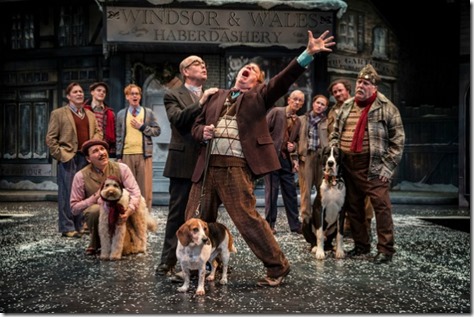A childhood friend writes:
How do you keep things fresh at 57? How do you look past the “formula” of a good story and just view the telling? Do you ever pass on a review because you couldn’t get the right perspective?
 Rightly or wrongly, I don’t find this to be a problem, except on the rare occasions when I feel I’ve already said everything that I’ve got to say about a given topic. (I no longer feel that I have anything particularly new to say about Aaron Copland or H.L. Mencken, for instance, so I don’t seek out opportunities to write about them.)
Rightly or wrongly, I don’t find this to be a problem, except on the rare occasions when I feel I’ve already said everything that I’ve got to say about a given topic. (I no longer feel that I have anything particularly new to say about Aaron Copland or H.L. Mencken, for instance, so I don’t seek out opportunities to write about them.)
My friend, however, puts his finger on a very interesting point in his second sentence. My Wall Street Journal columns are usually about eight hundred and fifty words long. That’s more than enough room to make my points, but not to “circle the airport,” so to speak. As a result, I can’t waste space on formulaic throat-clearing: I have to cut right to the chase. And when I’m reviewing a well-known play about which I’ve previously written, it’s even more important than usual that I approach the text as if it were new to me.
More often than not, the production itself solves that problem for me. My recent column about Barbara Gaines’ new Chicago Shakespeare production of The Merry Wives of Windsor, however, posed a special challenge, for Gaines has staged that play twice in the past decade, the first time in 2004. I saw and reviewed her earlier staging, and I’ve also covered two other productions for the Journal, at Shakespeare & Company in 2006 and at San Diego’s Old Globe in 2008. Would I have anything fresh to say this time around?
 I looked up my previous columns and discovered that in all three cases I’d written fairly brief notices that concentrated on the staging and performances, taking the merits of the play for granted. So I doubled down, devoting the entire column to The Merry Wives of Windsor (something that I don’t normally have the luxury of doing) and counting on Gaines, whose work I admire greatly, to make it worth my while.
I looked up my previous columns and discovered that in all three cases I’d written fairly brief notices that concentrated on the staging and performances, taking the merits of the play for granted. So I doubled down, devoting the entire column to The Merry Wives of Windsor (something that I don’t normally have the luxury of doing) and counting on Gaines, whose work I admire greatly, to make it worth my while.
As it turned out, I found her staging to be both satisfying and inspiring, so much so that I spent the whole first paragraph in what I think of as my “teaching mode,” talking about the play rather than the production and moving, as I like to do in theater reviews, from the general to the particular:
Humiliation is the engine of farce. He who laughs first is setting himself up for a pie in the face, and what makes it so funny is that he usually deserves it. But Shakespeare’s comedies of humiliation are also comedies of reconciliation in which the prideful are punished, then readmitted to the fold after they do penance by being made the butt of justified laughter. That’s why Malvolio’s bitter exit line in “Twelfth Night,” “I’ll be revenged on the whole pack of you,” is so unnerving: He refuses to play the game. And that’s why “The Merry Wives of Windsor,” in which Sir John Falstaff is punished for his unseemly lust, is so full of good humor: He isn’t the only one who takes the pie in the face. The humiliation is shared all around, after which everyone forgives everyone else and goes home together to “laugh this sport o’er by a country fire;/Sir John and all.” If you don’t go home happy from a production of “Merry Wives,” there’s something wrong with you–or the production.
The point is that I get excited every time I walk into a theater, and every time I sit down the next morning (or whenever) to think out loud about what I saw there. Nor do I think my drama reviews are formulaic, even when I’m forced, as sometimes happens, to review a formulaic show. Even after spending a decade on the aisle, I continue to find my job to be infinitely self-renewing. Perhaps I’ll feel differently a decade from now, assuming that I’m still writing theater reviews in 2024–but I doubt it.
